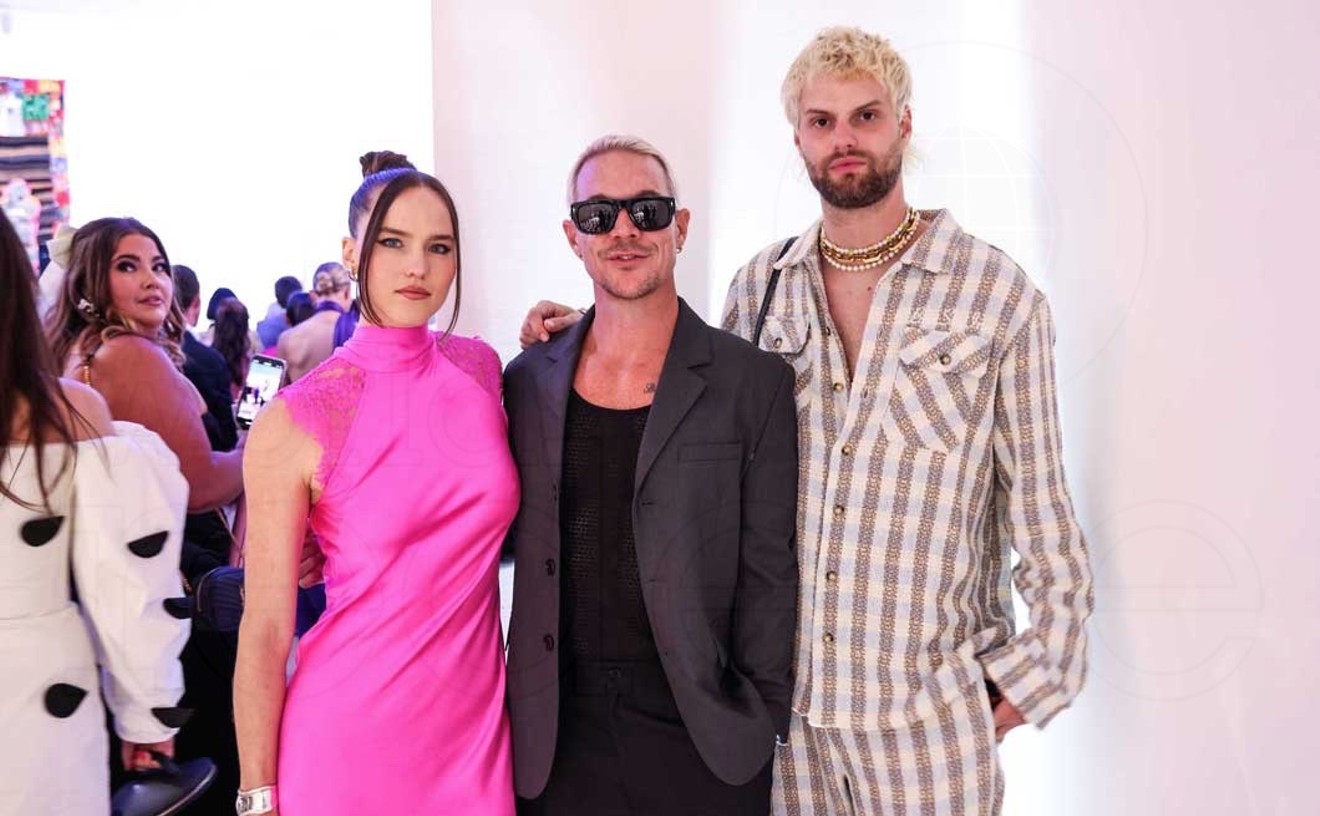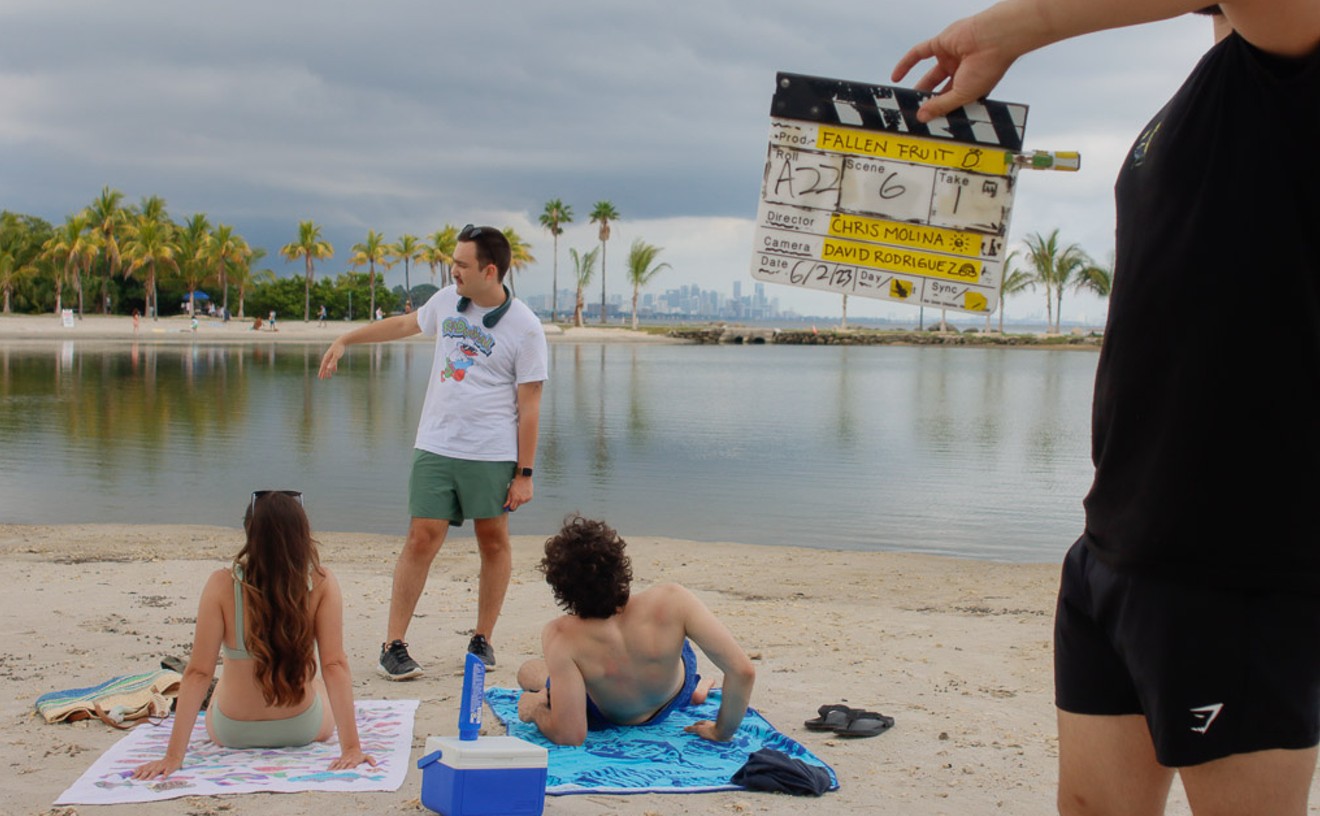While the sparring between the city's two demographic heavyweights -- Anglos and Hispanics -- continues, South Beach's Area Stage weighs in with its hilarious production of Rum & Coke, which makes the case that no one cares about ethnic labels nearly as much as they do about being pegged a fatso, a loser, an uncaring offspring, or a career failure.
Performing the one-woman show she wrote, double threat Carmen Pelaez beguilingly transforms herself into six characters in search of an identity. In monologues containing the funniest lines I've heard on-stage in years, she portrays half a dozen women, four Cuban Americans and two who remain on the island. Over the course of her uninterrupted 70-minute tour de force, Pelaez weaves the women's hopes together with the Cuban exile community's quest for a free Cuba until it's impossible to discern which serves as a metaphor for the other.
Clad in black pants and a chartreuse shirt over a black tank top, Pelaez forgoes costume changes and props as she spins her yarns from the archetypal storyteller's front porch, handsomely designed by Joe Adams. In the background, lighting designer J.C. Rodriguez's moonlit leaf shadows spill over the facade of a Spanish-style house.
Bounding onto the stage, strutting her stuff like a runway model, Pelaez as 22-year-old Camilas takes time off from her dishwashing job at the Fashion Cafe to explain that, like the owners of that hot spot, she too is headed for supermodel stardom. What the world of high fashion needs is a plump Hispanic to add a little "mambo chunk in the funk," she says. Practicing her pouts, she adds, "This is my 'I've got a little secret and I'll tell you if you're good' look." To add sexual allure to her repertoire, she's also trying to lose her virginity.
Whether angling for a man or a modeling gig, Camilas has figured out the simple key to success: "I've got to be able to be what everybody wants." In her efforts to discover who that is, Camilas serves as the show's guide, leading us to the other characters, beginning with her bubble-headed roommate Juana.
Despite telling Camilas that she is going to find someone who loves her for herself, Juana makes it clear that she defines herself by the men she is able to attract. Describing a disastrous club experience with a man who briefly made her feel classy, Juana squeals, "He's going to graduate school. Do you know what that means? He's going to graduate!"
These women are trying to measure up to what they believe is required of beauties and lovers. Two other Pelaez characters demonstrate that it is just as hard to win validation from family and country. Camilas's grandmother Alicia, a Cuban exile who spends her time protesting Castro's regime with prayer vigils and a hunger strike, which she carries out in shifts ("I'm here to protest starving in Cuba, not to show how it's done," she reasons). In between chanting slogans, she recalls the years she was separated from her husband and five children, who fled to the United States before she did.
Another woman, Iluminada, an earthy type who practices Santeria on Tuesdays and Thursdays and does manicures the other weekdays, continues to be haunted by her failure to visit Cuba to see her father one last time before he died. Reading Camilas's fortune in the cards, Iluminada urges her client to go to Cuba and visit Camilas's 86-year-old great-aunt Ninita while she can.
Nervous that Cuban police will concoct a reason to arrest her the minute she steps off the plane, Camilas goes nonetheless. There she is fed rations and family anecdotes by Ninita, whom she refers to as a "four-and-a-half-foot History Channel." She also meets Rum & Coke's last two women, who pin their dreams on careers once Castro is gone.
Kicked out of the ballet at twelve because of her dark complexion, Nikita ended up walking the streets two years later. Now at seventeen, the nearest she gets to being a prima ballerina is when she plays a distressed damsel in a come-on to a rich tourist. Sure that one day she will trade in her stiletto heels for toe shoes, she determines to stick it out, as does Nena, a former headliner at the fabled Tropicana. Working as a ladies room attendant after being accused of subversion, Nena wonders: "If Miami is so good, how come all the Cubans are trying to get back here?" and tells of giving up her chance on a raft because she could only be happy starring at the Tropicana.
Transformed by her experiences in Cuba, Camilas finds an identity that she can cling to -- that of an exile who, with the conviction of youth, vows to return to a free Cuba.
Performing most of the monologues like a skilled stand-up comedian, Pelaez is reminiscent of Whoopi Goldberg and Lily Tomlin in their Broadway outings, with one important difference: Those two comedians crafted their productions to prove they could portray anyone from a child to a man; Pelaez is intent on demonstrating that her characters could be anything were it not for Castro.
Although she often flirts with mounting the soapbox (particularly in the show's pointed ending), Pelaez usually pulls back in time, as when Camilas's grandmother sarcastically calls to another protester: "It only rained in Cuba when we wanted it to." Firing off killer wisecracks and flashing warm smiles, Pelaez puts a sugar coating on the bitter pill of Cuban-American politics. In the hands of this master storyteller, Rum & Coke becomes an evening spent with good friends who regale us with stories that leave us feeling we know more about them, and possibly about ourselves.
As good a storyteller as she is, Pelaez is an even better comedy writer. Much the same way that Neil Simon, Woody Allen, Carl Reiner, and Mel Brooks helped make Middle America accept Jewish culture in the Fifties and Sixties, Pelaez is able to translate the universal humor and specific attitudes of another culture. For example, she offers the following reasons for children born to exiles in the United States to refer to themselves as Cuban Americans. All of her life, Camilas says, she's been living two lives: the one she knows and the life her relatives constantly tell her would have been hers had Castro not come to power and her family not left Cuba. As Iluminada the fortuneteller puts it: "It doesn't matter where the egg was laid, as long as the chicken is Cuban."
This cultural mediator who has both Hispanics and Anglos rolling in the aisles carries a diplomatic portfolio that should please both camps: Pelaez is a Cuban American born and raised in Miami who went on to earn a degree from Manhattan's prestigious American Academy of Dramatic Arts. After graduating in 1993, she began developing Rum & Coke, which premiered off-off-Broadway in 1996.
After her appearance at Area Stage, Pelaez takes the show back to Manhattan for both Pulse Theatre's Femme Fest and HERE Theatre's One and Only Festival. I predict that another venue, your television screen, will soon follow, because with comedy talent like hers Pelaez is definitely headed places.
Still, much of the credit for the success of Rum & Coke must go to director John Rodaz, who guides the smooth shifts between characters and controls the frequent transitions from comic zingers to dramatic reflections with astute pacing. The result is a satisfying theatrical event that transcends just a great night at a comedy club.
So let the muckamucks in local government rename the region Miami-Dade County. Until Rum & Coke closes on February 1, I'll think of at least a certain strip of local real estate as Carmen Pelaez country.
Rum & Coke.
Written and performed by Carmen Pelaez; directed by John Rodaz. Through February 1. For more information call 673-8002 or see "Calendar Listings.










